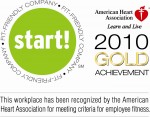ATSU recognized as Fit-Friendly Company
Posted: June 11, 2010
University recognized four years in a row by AHA
KIRKSVILLE, Mo. – The American Heart Association (AHA) has recognized A.T. Still University (ATSU) for its outstanding efforts to create a fitness- and wellness-friendly environment on its campuses in Kirksville, Mo., and Mesa, Ariz. This is the fourth consecutive year that the university has been recognized as a Gold Start! Fit-Friendly Company.
The Start! Fit-Friendly Companies Recognition Program is part of the AHA’s national movement that calls on all Americans and their employers to create a culture of physical activity and health to live longer, heart-healthier lives through walking. A catalyst for positive change in American business, the program recognizes employers who champion the health of their employees by creating physical activity programs within the workplace. The program is also meant to encourage other companies to participate and demonstrate similar physical activity practices for their employees.
Dan Martin, director of ATSU’s Thompson Campus Center and the university’s unofficial “fitness guru,” said recognition from the American Heart Association was especially important because of the AHA’s reputation nationwide as a health information and policy resource.
“When the American Heart Association says something, from CPR techniques to blood pressure management to exercise routines, people take it as fact and act immediately,” Martin said. “That they have recognized ATSU as the gold standard for fit-friendly work and education environments is a great endorsement of our university and an incentive to work every day to make them even better.”
The AHA evaluates organizations based on physical activities offered or encouraged; nutrition policies, alternatives, or incentives; and institutional culture.